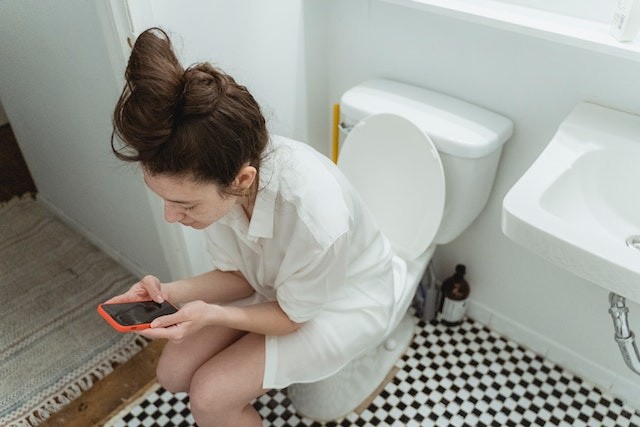
We and our smartphones are inseparable, and most of us, if not all, take them even in the bathroom. However, a new report suggested that it shouldn't be our habit.
Your Phone Is Dirtier Than Your Toilet Seats
Phone use-related health concerns typically center on how they can distract drivers, the potential impacts of radiofrequency radiation, or how potentially addicting they can be. However, your phone poses a significant danger of microbial infection, which is underestimated but incredibly real, according to the Conversation.
Most UK citizens use their phones while using the restroom, according to a 2019 survey. It, therefore, comes as no surprise that studies have proven that our mobile phones are more filthy than bathroom seats.
Unfortunately, parents let kids, who aren't known for their cleanliness, play with their phones. Additionally, we use our phones while eating and set them down on various (dirty) surfaces. All of which can transmit bacteria and food residue to your phone, feeding those microbes.
Hands are known to pick up bacteria and viruses frequently and to be a source of infection. So too, are the phones we use.
Numerous investigations on the microbiological contamination of mobile phones have revealed that they can harbor various potentially harmful germs.
According to a study, multiple pathogens have been discovered on smartphones, like diarrhea-inducing E. coli, Actinobacteria, which can cause tuberculosis, Citrobacter, which can lead to painful urinary tract infections, Enterococcus, which is known for meningitis, and skin-infecting Staphylococcus. Klebsiella, Micrococcus, Proteus, Pseudomonas, and Streptococcus were found on phones' surfaces.
They are frequently antibiotic-resistant, making treating them with traditional medications impossible. This is concerning since these bacteria can cause potentially fatal skin, gastrointestinal, and respiratory infections.
How to Clean Your Smartphones?
Sanitization must be a regular practice because research has shown that even after cleaning your phone with antibacterial wipes or alcohol, microbes can still recolonize it.
The US Federal Communications Commission recommends that you clean your gadgets daily, especially because the COVID-19 virus may survive many days on hard plastic surfaces, and we are still amid an active pandemic.
Use wipes or sprays that include alcohol. Phone casings and touch screens should be cleaned daily, if feasible, with solutions that contain at least 70% alcohol.
Spraying sanitizers straight onto the phone is not advised. Avoid getting liquids near the phone's connection ports or other holes.
Never use bleach or harsh cleansers. And when you're done cleaning, make sure to wash your hands thoroughly.
It will also be beneficial to consider how you handle your phone to prevent the growth of bacteria on it. When you're away from home, keep your phone in your pocket or backpack and make a to-do list on disposable paper rather than continuously checking your phone.
Use clean hands to touch your phone, ones that have been cleansed in soap and water or sanitized with an alcohol-based hand sanitizer.
You may take further steps to prevent viruses from spreading to your phone. If you have an infection or have not sanitized your phone, do not share it with anyone. Sanitize your phone as soon as possible if kids can play with it.
Additionally, make it a habit of putting your phone away while not in use and washing or sanitizing your hands afterward. When cleaning your phone, you might also wish to sanitize the charger.
Check out more news and information on Medicine & Health in Science Times.









